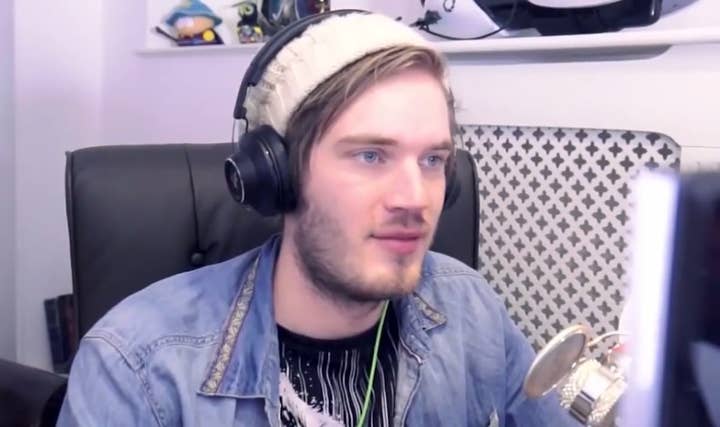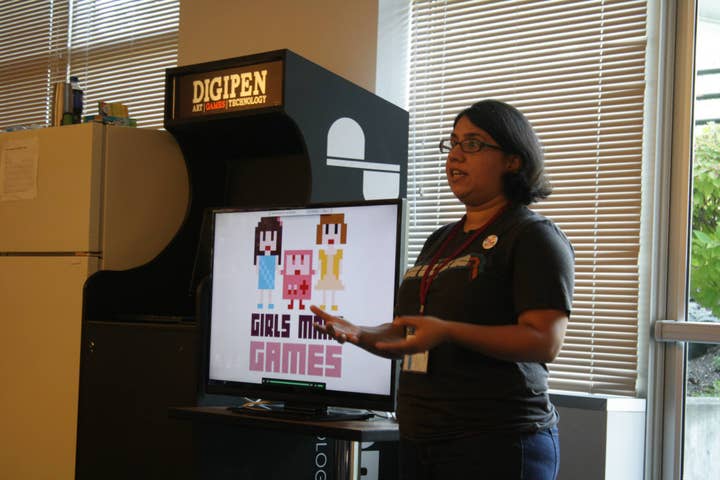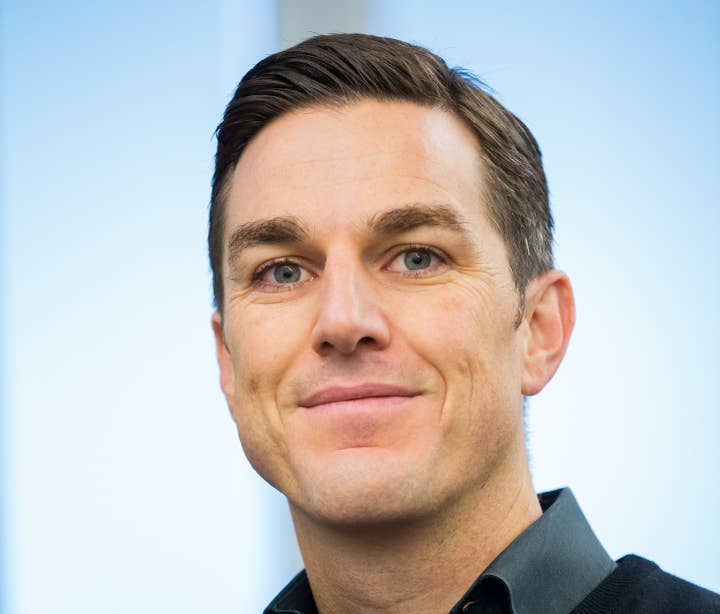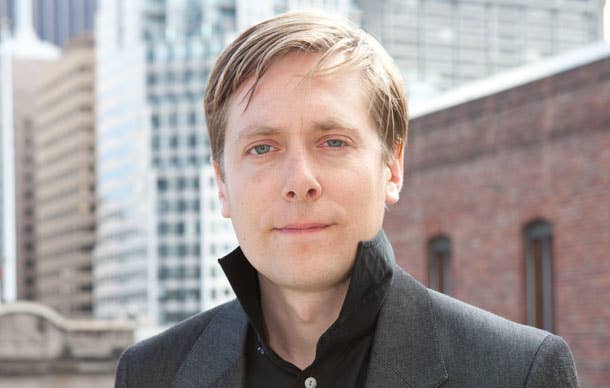People of the Year 2014
Celebrating six individuals who made their mark on games over the last 12 months
As anyone who's read this week's series of essays on the biggest news trends of the year could attest to, the games industry has had an eventful 2014. The PlayStation 4 and Xbox One collectively outperformed expectations in their first full year on shelves. Oculus and Twitch made for a record-breaking year of mergers and acquisitions, Kickstarter cooled off, and tempers heated up. And to cap it off, GamesIndustry.biz is making the long-awaited change to our year-end coverage. The traditionalists on staff have yielded to the new guard, and our Persons of the Year feature has been binned in favor of our all-new, all-different People of the Year.
Joking aside, we are doing People of the Year a little differently this time around. For one thing, it's not enough that these people made headlines or were key figures at big companies. We wanted to celebrate people, whether for positive contributions to the industry or simply for being very good at what they do. Secondly, we're not ranking them. At the risk of spilling secrets, angrily debating the relative importance of people and slotting them into a top 10 list is not why the staff here got into this field in the first place. As the new format clearly shows, the real reason we got into this was to single out six people with few (if any) metrics for comparison and offer them praise in no specific order. So here are our staff's picks for 2014's People of the Year.
PewDiePie, YouTube personality
His subscriber and viewing numbers are insane, the envy of TV channels, record labels and movie companies alike. He's a celebrity, a brand, a one-man network.

Games media has changed irrevocably. Again. Reading, it seems, is no longer the preferred method of information consumption and, if you're under the age of about 16, chances are that you probably don't read anything online unless there isn't a video which will tell you the same thing. Like any sea change in consumption, it's hit a lot of major outlets where it hurts.
Those tankers are turning, though. There aren't many gaming websites left that don't have specialist video teams, that don't have a significant YouTube presence, but it's the video specialists which are really leading the charge, in some cases precisely because they're not associated with a large media organisation. As the events of the latter half of 2014 showed us, there's a significant rise in the distrust of, or at least disinterest in, critical output from large media outlets. The reasoning behind that is complex enough to warrant a dozen features of its own, but one of the results is clearly observable: the rise of 'indie' media.
The biggest names on the gaming YouTube scene are individuals. Total Biscuit, Stampylongface, Pewdiepie, these are the new media giants. They're the trusted brands, the media destinations, the kingmakers. Looking down this list of gaming's most popular YouTube broadcasters, you have to scroll down to IGN in ninth before you hit an 'old school' media outlet. With their freedom, independence, and anarchy, one-person shows are running away with it.
Pewdiepie is their king. His subscriber and viewing numbers are insane, the envy of TV channels, record labels and movie companies alike. He's a celebrity, a brand, a one-man network. He's funny, approachable, young and good looking. He's a person, not a corporation.
But look a little more closely. Every one of the broadcasters on that list is part of a bigger organisation. Four in the top 10 alone, including the all-conquering Pewds, are signed up to Maker Studios. Maker, owned by Disney, is a vast, polished media agency which spans advertising, technology and programming, unified by massively effective vertical integration. These are not bedroom broadcasters, they're tightly managed presenters which are the bait on the latest 'better mousetrap' of advertising.
But I don't want to join the old media dogpile of snark that already surrounds these channels. These are, by and large, smart, talented individuals who know their audiences, managed by savvy agencies who know how to make the most of YouTube's mysterious algorithms. They're testing the boundaries a little, finding their limits. They're not trying to appeal to an older audience, not directly competing with written coverage. Crucially, as the Yogscast management has explained more than once, they're entertainers, not critics.
So they're not going away. One of the critical points that's yet to become clear is whether YouTube watchers become online readers when they grow older, or whether video is a habit which stays for life. Will millennials forever be a video generation? Whatever the outcome, Pewdiepie and the presenters like him are a major force in the industry. Whether you think it's marketing, consumption, or raw entertainment, it's something you'd better get used to.
Kate Edwards, IGDA executive director
Under the leadership of Kate Edwards in her second full year as executive director, the IGDA has been more vocal and more proactive on the advocacy front.

The International Game Developers Association's primary stated mission is "To advance the careers and enhance the lives of game developers by connecting members with their peers, promoting professional development, and advocating on issues that affect the developer community." While the group has long enjoyed numerous local chapters serving to help developers network and learn from one another, its advocacy efforts have traditionally been less visible, to put it charitably.
But under the leadership of Kate Edwards in her second full year as executive director, the IGDA has been more vocal and more proactive on the advocacy front. In February, the IGDA took King to task over its "predatory" trademark tactics when it came to Candy Crush Saga. And even though King dropped its trademark application for the word Candy in the US the follow week, the IGDA released a follow-up report in April to help give developers a better understanding of trademark law and better equip them to deal with such situations in the future.
And when the controversy that would become GamerGate erupted, the IGDA was among the first organizations to come out and decry the organized harassment as "abhorrent behavior," even as others hoped it would simply blow over, or remained quiet for fear of hurting the bottom line. And it wasn't just grandstanding on the industry's hot topic issue of the day; Edwards had been pushing for an IGDA harassment support group since last year, and consulted with the FBI in July on ways to minimize online harassment.
And in smaller but more telling matters, the IGDA this year took developers' temperature around another potential avenue of advocacy: Unionization. Although the IGDA has long treated the topic as a non-starter, the group included it on an expanded quality-of-life survey of about 2,200 developers. Perhaps surprisingly given how little the issue has been publicly discussed in the industry, 56 percent of developers were in favor of forming a union. It's unclear what role the IGDA would have in a unionized industry, one with an organization better positioned (and better funded) to advocate on behalf of creators. Refreshingly, that doesn't seem to matter. Under Edwards' direction, the group appears most driven not by its own best interests, but by those of its members.
Laila Shabir, Girls Make Games founder
Girls Make Games gives young women the chance not only to learn how to make their own games, but that they're allowed to, that it's a viable career choice.

Not many people become a revolutionary by accident, but you get the feeling that's what happened to Laila Shabir, founder of Girls Make Games. Quietly working on educational games at her company LearnDistrict one day, organising game development camps for young girls as far away as Australia the next.
"It was supposed to be a small summer camp that we did here in the Bay Area just because it was pretty frustrating being a games studio and not being able to recruit any women. So it was just myself and my husband, and four other guys, and it was like where are the women?" says Shabir.
Girls Make Games gives young women the chance not only to learn how to make their own games, but that they're allowed to, that it's a viable career choice.
"One question that comes up a lot when they meet other female game developers is 'how did you convince your parents to let you do this?' I think it's so funny because you never seen an 11 year old boy asking that question. He's not concerned about what his parents think," Shabir told GamesIndustry.biz
So Girls Make Games provides the safe place, through workshops, and chances to visit game development studios and to meet female game developers. In these troubled times this seems like the perfect way to attack the issue of diversity head on, encouraging the next-generation of game developers.
And it was the enthusiasm of the scheme audience that transformed Girls Make Games from one camp in San Francisco to many more reaching as far as Australia. The Grand Prize Winner from the first camp, a demo called The Hole Story, raised $31,136 on Kickstarter in August and was Greenlit on Steam.
Shabir actually comes from a financial background, working at the National Bureau of Economic Research and The Brookings Institution before founding LearnDistrict with Ish Syed in June 2013.
"What Girls Make Games really taught me is to keep my mind open about the direction your life is going to take," she says. "I think I came in thinking that with a startup life - because before this I was in finance and my life was very set, I had an office and everything but with the startup everything changes - so as long as what we're making is benefitting people, as long as we're working in education and raising awareness and doing good things, I think I'm going to keep an open mind with what we do."
Owen Mahoney, Nexon CEO
It's rare to see an executive at a major games company so passionately defend the creative side of the industry the way Mahoney has, while at the same time recognizing that promoting good artistic vision can also lead to good business.

While free-to-play has pushed its way to prominence in the last few years, the pioneers at Nexon have been making successful free-to-play games for over a decade now. And the company's persistence with the business model is clearly paying off. Since the promotion of Owen Mahoney earlier in the year from CFO to CEO, Nexon has been on a tear, growing sales and profits and investing heavily in Western development.
For the year ending December 31, Nexon is expecting net income to climb over 34 percent. While the bulk of the business has been driven by the firm's strength in its native Korea and other Asia territories, Mahoney has led the charge for significant Western expansion with numerous acquisitions and partnerships.
Not only did Nexon acquire a stake in Cliff Bleszinksi's Boss Key and land a publishing deal with former EA Phenomic team Envision, but the company also launched a separate publishing division focused on Western content. Nexon XP could be instrumental in the company's growth next year.
But more than the company's growth, it's Owen Mahoney's humble attitude and approach to the market that is so refreshing. In multiple interviews throughout the year, Mahoney has acknowledged that the games industry and the free-to-play sector at large has been "letting consumers down."
It's rare to see an executive at a major games company so passionately defend the creative side of the industry the way Mahoney has, while at the same time recognizing that promoting good artistic vision can also lead to good business.
"I don't want to criticize the industry too much, but I think all of us who are executives, who are responsible for spending money and investing capital in the games industry have done a disservice to the industry by focusing on money first and hearts second," he told GamesIndustry.biz in October. "I think what we need to do is focus on heart first and money second. By the way, that's a good business strategy. And when you do that a lot of things start to fall away as very unimportant and it makes for a much better industry."
Nexon's properties like Mabinogi, Vindictus and even MapleStory may not be instantly recognizable in the West, but with Mahoney's approach and Nexon's free-to-play pedigree it shouldn't be long before the company has a blockbuster in the Western hemisphere
Andrew Wilson
When virtually every big game seems to reach the market in a bedraggled daze, EA's year was defined as much by what it didn't release as what it did.

When it comes to venerating individuals for their achievements, choosing the CEO of a major publisher will often raise more questions than it answers. These are companies with thousands of employees, releasing dozens of products in wildly varying contexts throughout the year. It is nigh on impossible for the leader of any such organisation to look back over 12 months and find no cause for regret or concern.
Nevertheless, Andrew Wilson deserves no small amount of credit for his first full year as EA's CEO. At a time when the production line of sequels has seldom felt so prevalent or stifling, EA launched several games that served as a reminders of why AAA still dominates the conversation: the relentless fun of Titanfall, an all too rare new IP, and the sweeping grandeur of Dragon Age: Inquisition, persuasive evidence that Bioware has retained its identity despite the departure of its founders.
And just when virtually every big game seems to reach the market in a bedraggled daze, EA's year was defined as much by what it didn't release as what it did. The annual Need For Speed cycle was broken for the first time since Wilson joined the company back in 2000, while Battlefield Hardline was pushed into 2015 for some extra finesse - and to eradicate any possibility that Battlefield 4's disastrous technical problems might be repeated.
Wilson's current mantra is "Player First," and while one shouldn't lose sight of the corporate necessity of that sentiment, there are strong indications that the gamer really will benefit from having him at the rudder. EA Access, for example, is just the sort of progressive, consumer-friendly initiative that the major publishers should be championing. Indeed, it looks like a more impressive deal with every passing month, and Sony's decision to back away looks more dubious and self-interested as a result.
Much of this is subjective, of course, and there are areas in which EA's performance this year has been less impressive. But if you need an objective measure then look no further than its stock price, which has recovered from a real low in the middle of 2012 to more than double during Wilson's brief tenure as CEO. At the very least, he should have plenty of time to make good on this early potential.
David Helgason
Helgason is on this list for his role in Unity's past, certainly, but also for making a bold decision to ensure its future.

Unity Technologies turned 10 this year, and the numbers indicate that it has completed at least some version of its mission to democratise game development. At the last count, back in August, it had nearly 650,000 people actively working on a project every month, with almost half of all mobile developers building apps and games using its engine, its asset store, and a suite of services that grows more varied and comprehensive all the time.
Unity's growth has been so steady that it's easy to lose sight of just how influential it has become, but the news that David Helgason was stepping down as its CEO served as a timely reminder. While you could scarcely ask for a more experienced executive than John Riccitiello to take over the role, his close ties to the most corporate level of the games business sparked a general sense of unease. For years, Helgason's strategy had been to offer Unity's users more and more while removing as many financial barriers to entry as the company could sustain. What, exactly, would the former CEO of Electronic Arts make of such altruistic values? Some feared the onset of a big business mentality. Some suspected an outright sale.
And yet the root of those concerns is also the reason why Riccitiello is such a canny choice to take Unity forward. Helgason has stepped aside at a time when the company has proved the validity of its strategy beyond all doubt. Competitors that would have barely have registered Unity as a threat just a few years ago are now following its lead, and Xbox One and PlayStation 4 developers now have the freedom to make the brand as synonymous with consoles as it already is with PC and mobile.
Helgason's leadership has been a vital factor in Unity Technologies making it this far, and he has been honest enough to accept that, if the company is to keep progressing towards its original idealistic goal, his own skills and experience may no longer be enough. Helgason is on this list for his role in Unity's past, certainly, but also for making a bold decision to ensure its future.
Image credit: Getty Images

